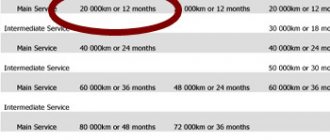The reader will find out which lubricant is used in the Toyota Verso variator, and which is used in the engine. He will find out why it is necessary to change the oil after a run of 60,000 kilometers and what can result from untimely replacement of lubricant and consumable components in the working parts of the machine.
Many car owners do not know what oil to pour into the Toyota Verso engine and variator . They use either cheap analogues or even Chinese counterfeits that they found on the market. This is fundamentally wrong.
CVT and manual transmission Toyota Verso
The vehicle of the Japanese manufacturer Toyota Verso uses one of the following types of gearboxes:
- variable speed drive;
- Manual Transmission.
If the latter can withstand 100,000 kilometers on dirty analog oil, then the variator will not survive this. The complex mechanism of the CVT requires careful handling and regular replacement of transmission fluid.
Attention! Under severe operating conditions of the car, the oil in the variator is changed after 60,000 kilometers. Since this lubricant not only plays a passive role as a protector of the gearbox components and the pressure supercharger, but also tightly connects the belt to the wedge so that the first does not break when the position of the pulleys changes.
Toyota CVT transmission and driving rules
The CVT variator is a continuously variable transmission type, which is a strong difference from its analogues due to its unique design. Gear shifting on a CVT machine is performed smoothly, without jolts, delays or slipping.
A car with this type of gearbox easily picks up speed; when accelerating, there are no jerks, delays and slipping, which are felt on other models of automatic transmissions, including even the newest versions of manual transmissions with two clutches.
At first glance, taking into account all the positive aspects, the CVT can be considered an excellent replacement for the classic version of the automatic transmission, but this is not true. The reason is that many drivers noted a much lower service life of CVT compared to automatic transmission, low repairability, high cost and a large number of restrictions during operation.
You should pick up speed in a car with such a gearbox smoothly, with a gradual increase in engine speed, otherwise breakdowns will appear after a short time. In reality, there are often cases when those who like to start abruptly from a traffic light have their CVTs break down already after 50-60 thousand kilometers.
In addition, the variator must be warmed up in the cold season, since they are highly sensitive to lubricant, which is worse for dispersing through the gearbox. Warming up the variator in the same way as an automatic transmission will not have the required effect, since it has differences in design from the hydromechanical type of automatic transmission.
The correct way to warm up the CVT is to turn on the N mode for a short time after the engine has warmed up, which will allow the hydraulic coupling to warm up. In addition, slipping and increased loads do not have the best effect on the condition of the variator.
Vehicles with this type of transmission are not suitable for towing trailers and owners should ensure that excessive loads are not placed on the transmission.
Which one to use
Therefore, the manufacturer has invented a special lubricant that meets all the requirements of the variator. This is what should be used in the box.
A special fluid called Multi CVTF is used to fill the variator. This lubricant is not recommended for use in hybrid vehicles with CVTs.
Technical characteristics of the lubricant:
- color – blue;
- density at 20 degrees Celsius with a plus sign – 0.8 cm³;
- viscosity at 40 degrees – 34.3 mm²/s;
- viscosity at operating temperature – 7.2 mm²/s;
- index – 180;
- combustion temperature – 210 degrees.
When replacing transmission fluid in a Toyota Verso, it will be necessary to replace the filter device (its catalog number is JT494K), seals for the drain plugs (No. 9043018008) and filler plugs (No. 9043012008). The car owner should also change the gasket on the pan (No. 3516812091).
All work must be carried out with gloves. Since the lubricant contains alkyl acetamide, which can cause allergies in humans.
Oil service
| Oil service on this variator was recommended to be carried out every 80-100 thousand mileage, while the transparency and oil level were checked every 50 thousand. The manufacturer recommended using Toyota Super CVT oil, which was designed specifically for continuously variable transmissions. All Toyota CVTs are sensitive to the level and purity of the oil, so there was no need to skimp on such a service. |
Simultaneously with the oil change, the valve body filter was also changed, which retained fine dust, preventing contamination of the plate due to significant wear of the transmission.
| If the car owner skimped on service and did not carry out such work in a timely manner, then, ultimately, the box would need to be rebuilt, including replacing expensive bearings and cones. |
How to change the fluid
For those who are changing the lubricant in a variator for the first time, step-by-step instructions for the procedure:
- Warm up the CVT gearbox to operating temperature.
- Place it in the pit. Turn off the engine.
- Unscrew the drain plug and place the container.
- Wait until all the grease has drained out.
- Unscrew the pan bolts and remove it.
- Clean the magnets and the bottom of the tray. Replace the gasket.
- Unscrew the bolts holding the filter and replace it with a fresh one.
- Install everything in reverse order.
- Fill with fresh fluid.
This is how a partial change of lubricant is done after 30 thousand kilometers. A complete replacement must be done at a service center using a high-pressure apparatus.
Now the car owner knows what oil to pour into the Toyota Verso variator. Next we will talk about lubricant for the engine of a Japanese vehicle
Oil change Toyota Vitz
The oil on this machine is changed with the following sequence of actions:
- The car should be raised on a lift; at the bottom there is a plug marked check that can be unscrewed;
- Unscrew the bolts on the pan, wait until the oil drains, and remove it completely. The oil filter is detected and unscrewed, the remaining oil drains;
- An oil filter is installed;
- Dirt is removed;
- A new gasket and pan are installed;
- Oil is poured into the hole, which is closed with a black plug and held in place with a bolt.
Properties
Low viscosity 5W30 gives fast pumpability and easy starting at low temperatures. For the regions of the Far North, this is an important property that engine lubrication has.
The rapid supply of low-viscosity fluid reduces the dry friction time of engine parts. This reduces the wear of rubbing elements. After filling with this oil, hydraulic compensators and variable valve timing systems work clearly.
5W30 has a high base number, which allows the lubricant to work many more hours than any other lubricant. And low volatility and ash formation reduce the load on particulate filters and catalysts.
This lubricant is produced without additives. Since the composition is so diverse in properties that it does not require additional correction with various additive elements that can kill the motor.
This oil can be used in extreme engine operating conditions and at low temperatures. It is not afraid of large seasonal runs.
CVT differences
A CVT transmission differs from an automatic transmission in that it does not have gear shift stages. This means that the driver does not feel the jolts and jerks typical of automatic machines when accelerating. This happens because the gears change due to the movement of pulleys connected to each other by a belt.
The pulleys change their position, which means the transmission changes. For example, when the drive and driven shafts are shifted, the vehicle speed does not exceed first gear. The further apart the pulleys move, the faster the machine speeds up.
How to change in the motor
If everything is clear with the question of what kind of oil to pour into a Toyota Verso vehicle, then the following instructions are for those who will be pouring liquid into the engine for the first time.
- Warm up the engine. Warmed fluid flows out of the engine better. This means more waste lubricant will be released. The new fluid will not mix with the used one.
- Drive into the pit. Or jack up the car. This will allow you to gain access to the bottom of the machine and unscrew the engine protective housing, and then the drain plug.
- Unscrew the filler plug. This will drain the oil faster.
- Place a drain container under the machine and unscrew the drain plug.
- Wait until all the liquid has drained out.
- Fill in the flushing fluid, tighten all the plugs and start the engine. Let work for up to 10 minutes.
- Drain everything back into the container.
- Change the fuel filter. But before installing a new one, pour about 100 grams of fresh oil into the latter.
- Fill in new lubricant. Check level. It should be centered between the minimum and maximum marks.
- Start the engine and drive the car for five kilometers. View level. If necessary, top up.
Now the car owner knows what kind of oil needs to be poured into a Toyota Verso car and at what time to do it.
Home \ Verso \ Maintenance Regulations
| Maintenance at 10,000 km | Maintenance at 110,000 km | Maintenance at 210,000 km | Maintenance at 310,000 km |
| Maintenance at 20,000 km | Maintenance at 120,000 km | Maintenance at 220,000 km | Maintenance at 320,000 km |
| Maintenance at 30,000 km | Maintenance at 130,000 km | Maintenance at 230,000 km | Maintenance at 330,000 km |
| Maintenance at 40,000 km | Maintenance at 140,000 km | Maintenance at 240,000 km | Maintenance at 340,000 km |
| Maintenance at 50,000 km | Maintenance at 150,000 km | Maintenance at 250,000 km | Maintenance at 350,000 km |
| Maintenance at 60,000 km | Maintenance at 160,000 km | Maintenance at 260,000 km | Maintenance at 360,000 km |
| Maintenance at 70,000 km | Maintenance at 170,000 km | Maintenance at 270,000 km | Maintenance at 370,000 km |
| Maintenance at 80,000 km | Maintenance at 180,000 km | Maintenance at 280,000 km | Maintenance at 380,000 km |
| Maintenance at 90,000 km | Maintenance at 190,000 km | Maintenance at 290,000 km | Maintenance at 390,000 km |
| Maintenance at 100,000 km | Maintenance at 200,000 km | Maintenance at 300,000 km | Maintenance at 400,000 km |
| Go through maintenance with us, for regular customers there are bonuses, discounts and nice gifts. Toyota Verso maintenance regulations . Replace and/or check the car according to the regulations and you are guaranteed reliable operation of the car. >> Find out the cost of undergoing maintenance < |
| № | List of works | 10 t. km | 20 t. km | 30 t. km | 40 t. km | 50 t. km | 60 t. km | 70 t. km | 80 t. km | 90 t. km | 100 t. km |
| 1 | Drive belts - check, adjustment | P | P | P | P | P | |||||
| 2 | Engine oil, engine oil filter | h | h | h | h | h | h | h | h | h | h |
| 3 | Coolant for engine, power steering, windshield and headlight washers - level check | P | P | P | P | P | P | P | P | P | P |
| 4 | Vehicle components and assemblies - checking for leaks and external damage | P | P | P | P | P | P | P | P | P | P |
| 5 | Radiator - checking cleanliness, checking hose connections and their correct location, corrosion, etc. | P | P | P | |||||||
| 6 | Exhaust systems - leak testing | P | P | P | P | P | |||||
| 7 | Spark plug | Replacement every 100,000 km | |||||||||
| 8 | Battery - checking charge, electrolyte level and density, terminal condition | P | P | P | P | P | P | P | P | P | P |
| 9 | Fuel filter | h | |||||||||
| 10 | Air filter | P | h | P | h | P | |||||
| 11 | Fuel tank cap, fuel lines - check | P | P | P | |||||||
| 12 | Fuel vapor adsorber - check | P | P | ||||||||
| 13 | Brake system - checking the brake pedal, condition of brake pads, discs, calipers, parking brake lever travel, absence of leaks, condition of pipelines, hoses, connections, cylinders, cleaning and lubrication of brake mechanisms | P | P | P | P | P | P | P | P | P | P |
| 14 | Parking brake - check | P | P | P | P | P | |||||
| 15 | Brake fluid - check, replacement | P | P | P | h | P | P | P | h | P | P |
| 16 | Checking and replacing clutch fluid for models with manual transmission | P | P | P | h | P | P | P | h | P | P |
| 17 | Steering - check for play, condition of boots, ease of rotation of the steering wheel | P | P | P | P | P | |||||
| 18 | Drive shafts and drive shaft boots - check | P | P | P | P | P | P | P | P | P | P |
| 19 | Suspension joints, joint boots, wheel bearing play - check | P | P | P | P | P | P | P | P | P | P |
| 20 | Gear shift lever for models with 6-speed manual transmission | P | P | P | |||||||
| 21 | Transmission oil - check for models with manual transmission | P | P | ||||||||
| 22 | Checking the fluid for the Multidrive S | P | P | ||||||||
| 23 | Tires - checking condition and pressure | P | P | P | P | P | P | P | P | P | P |
| 24 | External and internal lighting devices, sound signals, windshield wipers and washers - check | P | P | P | P | P | P | P | P | P | P |
| 25 | Cabin filter | h | h | h | h | h | h | h | h | h | h |
| 26 | Air conditioning systems - checking operation and refrigerant level | P | P | P | P | P | |||||
The recommended periodic maintenance interval for your Toyota Verso is every 10,000 km or once every 12 months, whichever comes first.
| № | Product Name | vendor code | Photo | Necessary volume, l (pcs). | price, rub. | Buy |
| 1 | Toyota engine oil, 5W-40, 5l | 0888080375 | 3.9 l | from 1600 | ||
| 2 | Toyota engine oil, 5W-40, 1l | 0888080376 | ||||
| 3 | Toyota oil filter | 0415237010 | 1 PC | from 170 | ||
| 4 | Toyota oil filter | 90915YZZE2 | 1 PC | from 220 | ||
| 5 | Washer for engine sump drain bolt | 9043012031 | 1 PC | 50 | ||
| 6 | Air filter Toyota | 178010D060 | 1 PC | from 220 | ||
| 7 | Toyota cabin filter | 8713902020 | 1 PC | from 230 | ||
| 8 | Toyota fuel filter | 7702442060 | 1 PC | from 5800 | ||
| 9 | Toyota spark plug | 9091901253 | 4 things | from 350 | ||
| 10 | Transmission oil for automatic transmission, ATF WS, 4l | 0888602305 | Full replacement - 10.5 l Partial replacement - 3.7 l | from 2000 | ||
| 11 | Transmission oil for variator, CVT, 4 l | 0888602105 | 3.8 l | from 2500 | ||
| 12 | Transmission oil for manual transmission, MTF 75W, 1l | 0888580606 | 2 l | from 750 | ||
| 13 | Antifreeze Toyota Pink (pink), 5l | 0888980072 | 7.5 l | from 2700 | ||
| 14 | Antifreeze Toyota Pink (pink), 1l | 0888980140 | from 1000 | |||
| 15 | Brake fluid Toyota DOT4, 1l | 0882380112 | 1 l | from 150 | ||
| 16 | Lubricant for maintenance of Toyota brake calipers | 0888783010 | 1 PC | from 350 |
When completely replacing the transmission oil in an automatic transmission, we recommend replacing the automatic transmission filter, the O-ring for the automatic transmission filter, and the automatic transmission pan gasket.
| № | Product Name | vendor code | Photo | Required volume l (pcs) | Price | Buy |
| 1 | Automatic transmission pan gasket | 1 PC | from 450 | |||
| 2 | Automatic transmission filter | 1 PC | from 1500 | |||
| 3 | Automatic transmission filter gasket (O-ring) | 1 PC | from 150 |
Filling volumes and oil selection
It is recommended to fill Toyota Verso engines with original SL specification engine oil, in particular Toyota 5W30 or 0W20. If it is not possible to cast the original one, of course, you can use any more or less normal company.
Filling volumes directly depend on the engine; the larger it is, the more lubricant is needed:
- 1.6 (1ZR-FAE) - 4.2 l
- 1.8 (2ZR-FAE) - 4.2 l
- 2.0 diesel (1AD-FTV) - 6.3 l
- 2.2 (2AD-FHV) - 5.9 l
The frequency of engine maintenance is every 10 - 15,000 km or once a year.











